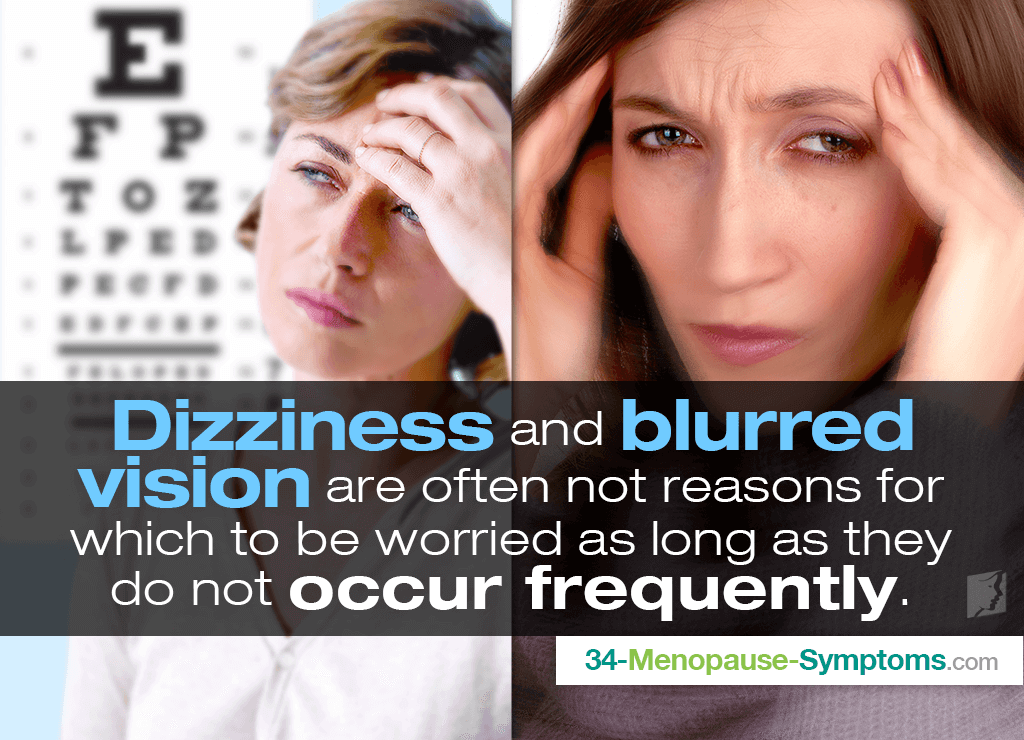It is common for women to experience spells of dizziness and blurred vision once in a while; each of which can be caused by various factors. However, many may wonder exactly when they should be concerned about the symptoms and when to ignore them.
Continue reading to learn more about dizziness and blurred vision as well as when to see a doctor and treatment tips so you can stay on top of your own health.
Dizziness
Dizziness can be described as when a woman feels weak, unsteady, faint, or woozy. Dizziness that creates the sensation as if you or your surroundings are moving when everything is perfectly still can be referred to as vertigo.
While the symptom has a number of causes, the most common for menopausal women is hormonal imbalance. Fluctuating levels can negatively affect blood sugar levels, leading to dizziness or disequilibrium. Also, increased estrogen can interfere with inner ear function - responsible for balance - as it can induce swelling.
Other causes of dizziness include inner ear disorders, infections, migraines, drops in blood pressure, anemia, anxiety disorders, medications, overheating, dehydration, and many more.
Blurred Vision
Blurred vision can be defined as vision that is not sharp or clear. The symptom can affect one or both eyes. It should not be mistaken for cloudy vision, which is when objects may appear obscured or dense.
It is also not uncommon for menopausal women to experience blurred vision alongside chronically dry and scratchy eyes as well as light sensitivity. Similar to dizziness, this is due to fluctuating reproductive hormone levels, specifically estrogen, as it can make the cornea more elastic, affecting light refraction.
Other causes of blurred vision unrelated to hormones include cataracts; blocked tear ducts; astigmatism; age-related macular degeneration (AMD); corneal abrasions, lacerations, or ulcers; diabetic retinopathy; farsightedness or nearsightedness; and many more.
Should I Be Worried?
By itself, dizziness is often not a reason for which to be worried as long as it does not occur frequently. Occasional dizzy spells rarely point to a life-threatening condition. Likewise, women should understand that blurred vision is also nothing to worry about if it occurs from time to time. Gradual vision changes happen to everyone as we age.
However, see a doctor if you experience dizziness and blurred vision along with sudden, severe headaches; difficulty breathing; numbness; confusion or slurred speech; continual vomiting; double vision; bulging of the eyes; loss of peripheral vision; or other disturbing symptoms.
Tips for Relieving Dizziness and Blurred Vision
Finding lasting relief from consistent bouts of dizziness and blurred vision is focused on balancing the hormones that are throwing your body systems out of whack.
The safest way to do so is through natural and effective blurred vision and dizziness treatments that start with making healthy lifestyle adjustments of an improved diet alongside wholesome habits. Consume a wide variety of fresh foods that contain phytoestrogens and vitamins B, D, and E along with omega-3s to promote healthy circulation and hormonal balance. It may prove useful to keep a journal so that you can keep track of instances of blurred vision and dizziness to show your doctor if need be.
Pair these and more lifestyle changes with alternative medicine for optimal results. Phytoestrogenic herbal supplements, like black cohosh and licorice, help fill the hormonal gap while hormone-balancing supplements, such as Macafem, work with the body to encourage natural hormonal production, thus resolving symptoms of dizziness, blurred vision, and many more during menopause.
Key Takeaways
Dizziness and blurred vision are two common symptoms that can occur throughout women's reproductive lives. Dizziness can leave a woman feeling off balance, faint, and weak, while blurred vision affects her line of sight, causing objects to lose focus. During menopause, they are predominantly caused by fluctuating reproductive hormones, especially estrogen, but both symptoms have a list of other causes as well.
If they occur simultaneously once in a while, there is generally no need for concern. However, seek immediate medical attention if accompanied by double vision; confusion; numbness; sudden, severe headaches; difficulty breathing; and further disturbing symptoms.
Sources
- American Academy of Ophthalmology. (2015). Blurriness | How Hormones Can Affect Eyes and Vision. Retrieved January 8, 2019, from https://www.aao.org/eye-health/symptoms/blurriness-2 | https://www.aao.org/eye-health/tips-prevention/how-hormones-can-affect-eyes-vision
- Mayo Clinic. (2018). Dizziness: Symptoms & causes. Retrieved January 8, 2019, from https://www.mayoclinic.org/diseases-conditions/dizziness/symptoms-causes/syc-20371787
- The North American Menopause Society. (n.d.). Menopause and Eye Health. Retrieved January 8, 2019, from https://www.menopause.org/for-women/menopauseflashes/women%27s-health-and-menopause/menopause-and-eye-health
- Vestibular Disorders Association. (n.d.). Hormones and Vestibular Disorders. Retrieved January 8, 2019, from https://vestibular.org/sites/default/files/page_files/Hormones%20and%20Vestibular%20Disorders_0.pdf




